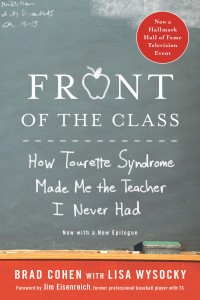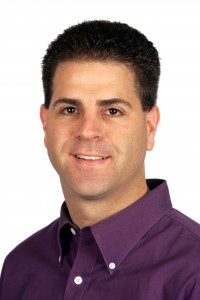 With all of the news stories about kids being bullied, we often forget that there are some kids that are labeled “different” who have no control over why they are different. Brad Cohen, author of “Front of the Class: How Tourette Syndrome Made Me the Teacher I Never Had," shared his experience of growing up as a child who exhibited several neurological tics because of TS.
With all of the news stories about kids being bullied, we often forget that there are some kids that are labeled “different” who have no control over why they are different. Brad Cohen, author of “Front of the Class: How Tourette Syndrome Made Me the Teacher I Never Had," shared his experience of growing up as a child who exhibited several neurological tics because of TS.
Brad writes:
In fourth grade I developed the strange new habit of clearing my throat every few seconds, all day long. … Like “Lord of the Flies” the kids in my school turned on the one child who was different from all the rest. … At that time, the social resources for conditions like mine were so few and far between that as my symptoms grew deeper, my mother and brother found themselves alone in the house with a virtual stranger. He looked like me, but he was entering all of our lives in staccato bursts of behavior that I couldn’t predict, and over which I had very little control. I, like many people with TS, have a short attention span and some mild obsessive behaviors. Many with TS also have attention deficit disorder (ADD), attention deficit hyperactivity disorder (ADHD); or obsessive-compulsive disorder (OCD). And so along with the beginnings of facial twitches and rebellious behaviors came the attention span of a gnat.
Since TS includes uncontrollable neurological behaviors, such as rapid eye blinking, coughing, tics, vocalizations and other behaviors that adults may view as disrespectful or out of control, I’m wondering how many young people are misjudged by teachers, principals or judges. My husband, Steve, was reprimanded in fifth grade by a teacher who told him to stop wheezing in class. Since he has severe allergies, it’s amazing to me that a teacher would reprimand him. Brad said, “Telling people with Tourettes to stop a behavior is like ordering someone with allergies not to sneeze.” According to the Centers for Disease Control in Atlanta, over 200,000 young people, mostly boys, live with TS. I asked Brad Cohen, currently serving as an assistant principal, for his advice on how to help children and teens who are “different.”
 JJIE: What would you like people to know about the experience of growing up with TS?
JJIE: What would you like people to know about the experience of growing up with TS?
COHEN: Growing up with TS is never easy. It is important for people to understand that TS is not a behavior problem. It is a neurological disorder. The people who have tics don't choose to do them. They don't want to do them. The hardest thing about living with TS is ignorance; it is the people who don't know and those who don't want to know. Once others are educated, it makes those with TS feel a lot more at ease. Also note that not everyone with TS curses. It is a bad stereotype that Hollywood has given the condition. The fact is that fewer than 10 percent of those with TS have this cursing which is called corporlalia. Last, we must recognize that most people with TS are very bright. TS does not affect one’s intelligence. Many people with TS have lots of strengths. Once they focus on those strengths, their TS issues seem to slow down.
JJIE: I know one of your main goals in life is education -- either educating students in school or educating people about TS. What do you wish you had known earlier in life?
COHEN: I wish I knew that everything would be OK. From as young as 10-years-old, I was fearful of the unknown. I just wanted to be treated like everyone else: with respect! I did question: Would people accept me even though I'm different? Would I be successful at things like my peers? Would I be able to find success? Ultimately, I was able to rise above these doubts as I kept a positive attitude and continued to persevere. But it is my hope that we can address these issues earlier in the lives of children so they don't have to go through what I had to deal with.

Brad Cohen - Photo courtesy Brad Cohen / ClassPerformance.com
JJIE: What would you say to a kid who doesn't know what's going on, but is slowly realizing that his brain or body is not working exactly the same as everyone else’s?
COHEN: I would explain that I don't want to do this, but my brain is telling me to do it. I would compare it to blinking my eyes. My brain tells me to do it all day and I don't even realize it most of the time. Similar to the blinking, my tics act the same way.
JJIE: What advice would you give to the adult who may be witnessing the isolation or actual bullying students might be experiencing from this or other issues? How can you help that particular child and how can you help others to be more empathetic?
COHEN: I believe the empathy part comes into play as you build relationships with people. Once they truly get to know you, they better understand your struggles and celebrations. If someone is a witness to bullying, it is imperative to be that one person to stand up and make a difference in the life of that child. To be a bullying bystander is just as bad as being the bully. Be proactive and help that child who needs you now, more than ever.
JJIE: Anything else you’d like to share with those of us who work with young people?
COHEN: I'm honored that my book, “Front of the Class”, continues to inspire people across the nation. After an appearance on the “Oprah Winfrey Show”, the book was turned into a Hallmark Hall of Fame movie in 2008 and continues to replay on the Hallmark Channel. I'm also honored that I've been able to start the Brad Cohen Tourette Foundation to help support kids with TS across the United States. We supply grants for programs that focus on the needs of children with TS. These include summer camps, family weekends, weekend camps, advocacy programs, social events and educational opportunities in the schools.
